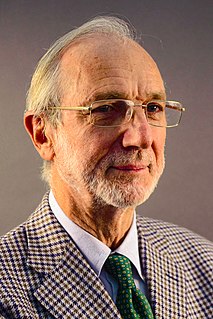A Quote by David McCullough
I feel very strongly that history is about everything. It isn't just about politics or the military or social issues. If art, music, engineering, science, medicine, finance, the world of architecture and technology - if those are left out, then you're not getting a full sense of the human condition. History is human and we human beings are involved in all kinds of things and that's part of our humanity.
Quote Topics
About
All Kinds
Architecture
Art
Beings
Condition
Engineering
Everything
Feel
Finance
Full
Getting
History
Human
Human Being
Human Beings
Human Condition
Humanity
Involved
Issues
Just
Kinds
Left
Left Out
Medicine
Military
Music
Our
Out
Part
Politics
Science
Sense
Social
Social Issues
Strongly
Technology
Then
Things
Those
Very
Very Strong
World
Related Quotes
History is not just about dates and quotations. And it's not just about politics, the military and social issues, though much of it of course is about that. It's about everything. It's about life history. It's human. And we have to see it that way. We have to teach it that way. We have to read it that way. It's about art, music, literature, money, science, love - the human experience.
Architecture is art. I don't think you should say that too much, but it is art. I mean, architecture is many, many things. Architecture is science, is technology, is geography, is typography, is anthropology, is sociology, is art, is history. You know all this comes together. Architecture is a kind of bouillabaisse, an incredible bouillabaisse. And, by the way, architecture is also a very polluted art in the sense that it's polluted by life, and by the complexity of things.
Medicine is a social science, and politics is nothing else but medicine on a large scale. Medicine, as a social science, as the science of human beings, has the obligation to point out problems and to attempt their theoretical solution: the politician, the practical anthropologist, must find the means for their actual solution. The physicians are the natural attorneys of the poor, and social problems fall to a large extent within their jurisdiction.
The history of science, like the history of all human ideas, is a history of irresponsible dreams, of obstinacy, and of error. But science is one of the very few human activities-perhaps the only one-in which errors are systematically criticized and fairly often, in time, corrected. This is why we can say that, in science, we often learn from our mistakes, and why we can speak clearly and sensibly about making progress there. In most other fields of human endeavour there is change, but rarely progress ... And in most fields we do not even know how to evaluate change.
The sciences that purport to treat of human things -- the new scientific storyings of the social, the political, the racial or ethnic, and the psychic, nature of human beings -- treat not of human things but mere things, things that make up the physical, or circumstantial, content of human life but are not of the stuff of humanity, have not the human essence in them.
The human condition comprehends more than the condition under which life has been given to man. Men are conditioned beings because everything they come in contact with turns immediately into a condition of their existence. The world in which the vita activa spends itself consists of things produced by human activities; but the things that owe their existence exclusively to men nevertheless constantly condition their human makers.
The question is wholly other, deeper and equally relevant to all: whether we shall, by whatever means, succeed in reconstituting the natural world as the true terrain of politics, rehabilitating the personal experience of human beings as the initial measure of things, placing morality above politics and responsibility above our desires, in making human community meaningful, in returning content to human speech, in reconstituting, as the focus of all social action, the autonomous, integral, and dignified human "I."
As a result of reading science fiction when I was eight, I grew up with an interest in music, architecture, city planning, transportation, politics, ethics, aesthetics on any level, art...it's just total! It's a complete commitment to the whole human race on all the Earth. That's what science fiction is about.
in addition to the conditions under which life is given to man on earth, and partly out of them, men constantly create their own, self-made conditions, which, their human origins notwithstanding, possess the same conditioning power as natural things. whatever touches or enters into a sustained relationship with human life immediately assumes the character of a condition of human existence. this is why men, no matter what they do, are always conditioned beings. whatever enters the human world of its own accord or is drawn into it by human effort becomes part of the human condition.
I'm keeping everything on a human level, but essentially everything in our lives has to be on a human level. Any specification of something by art history doesn't make any sense. The point is, if you have a loving, adorable, supportive mother anywhere in the world and you tell her all of your dreams, all of your aspirations, and the reward you would like, and she understands you, then it's not worth doing.
. . .a sense of humor can be a great help-particularly a sense of humor about (oneself). William Howard Taft joked about his own corpulence and people loved it; took nothing from his inherent dignity. Lincoln eased tense moments with bawdy stories, and often poked fun at himself-and history honors him for this human quality. A sense of humor is part of the art of leadership, of getting along with people, of getting things done.





































